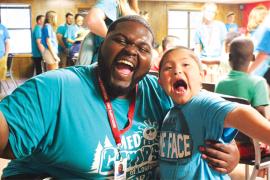In the early ’80s, I graduated from high school and made a simple but life-changing decision. It was May and I hadn’t yet made plans for the summer. My mom encouraged me to call my former camp directors, Herman and Rodger, and inquire about a summer working at camp. I so enjoyed camp as a kid but had missed out on being a counselor-trainee because of other commitments. A summer working outside with kids as a junior counselor sounded great. After a rigorous application process and being initially wait-listed for a position, I was fortunate to fill a last-minute cancellation working with 12- and 13-year-old boys as a bunk counselor. That first summer on camp staff was extraordinary. I had never worked so hard or enjoyed work so much.
Those experiences led to three more summers working at camp, each year offering me progressively more responsibility and satisfying challenges. After working as a counselor, I served as a unit head. The next summer I was the outdoor living skills director, and my final summer I was the program director. The kids I worked with over those summers were each unique, amazing, and loved camp. Many of them came back as summer staff when they were old enough and today are happy, successful men raising families and working in fields like medicine, engineering, education, and entertainment.
Those summers at camp taught me important lessons about leadership, collaboration, contribution, spontaneity, planning, ambiguity, teamwork, diplomacy, and so much more. At 19, I was managing a team of 15 and, at 21, was managing over 100 colleagues. The days were endless, exciting and, in retrospect, I believe positively addictive. I am very grateful to my camp directors and camp leaders for giving me chances to make mistakes, learn, grow, and flourish at camp throughout my college years. Those were some of the best days of my life.
So why is it so challenging for camp directors across the country to recruit seasonal camp staff? Where else can a college student find work that offers such deeply satisfying responsibility and opportunity to grow through daily challenges? The reality today is that universities are now requiring students to complete summer internships that are relevant to their major, and many parents are not aware that camp jobs are chock full of essential 21st-century learning and social-emotional skills practice.
Knowing how difficult staff recruitment has become, ACA has created a new volunteer initiative, "Project Real Job." Under the leadership of volunteer cochairs Deb Jordan and Kim Aycock, this committee will work to develop a variety of tools to make it easier for camp staffers to articulate the value of camp staff experiences to their university advisers and prospective employers, as well as earn credit for camp internships. The committee will also be developing tools to assist camps in communicating the career-enhancing benefits of working at camp to prospective employees and their parents with the help of camp alumni in various fields. Deb and Kim are eager to engage many volunteers in this work and other related projects. You may have seen the article "A Meeting of the Minds" in the previous issue of Camping Magazine. This is one of the outgrowths of the committee’s work, which is based on face-to-face sessions Deb and Kim have been conducting at ACA conferences. You’ll likely see additional articles and blogs that share the committee’s progress and present other ideas about addressing recruiting and retention challenges being faced today.
If you are interested in volunteering for Project Real Job, please sign up online by logging in to the ACA Connect Volunteer Opportunities Center, or contact Project Real Job Staff Liaison Henry DeHart at [email protected].
As Project Real Job gets underway, ACA and the University of Utah are engaged in a research partnership grant funded by the Spencer Foundation, which seeks to reposition camp employment as a valuable experiential leadership training opportunity that ultimately prepares young camp staff for success in future college and career endeavors. I’m very grateful to Deb Bialeschki at ACA and Jim Sibthorpe and Michael Riley for this important research and look forward to the impact of their work on our field.

